The deadline to register for the ninth International Conference on the Reuse of Public Sector Information organized by ASEDIE is now open. The event will take place on November 30 at the headquarters of the National Geographic Institute, in Madrid.
Here we review the main conclusions taken from the 7th Aporta Meeting, which took place on October 24 at the headquarters of SESIAD and where national and international experts from the open data sector met.
With the title ´The value of data in the global ecosystem´, this year’s edition focused on analysing the benefit of opening up data for the economy, society, or the research field. Also, the evolution of the international open data roadmap was reviewed; and new technology linked to data was discussed, such as the internet of things, natural language processing and big data.
The Director of Red.es, José Manuel Leceta, who opened the meeting, referred to data as the catalyst for the 21st century and the body that aims to be “a meeting point for initiatives of the sector”. Equally, the willingness to continue expanding the catalogue from datos.gob.es and to adopt what is stated by the International Charter for Open Data, as well as “other initiatives that may continue to generate value, such as carrying out studies or sectorial meetings of this type”.
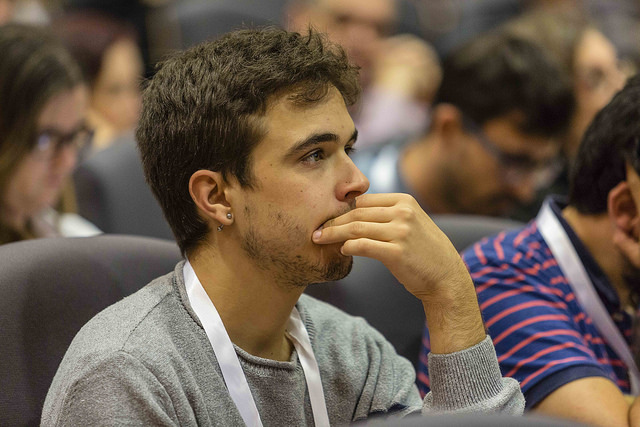
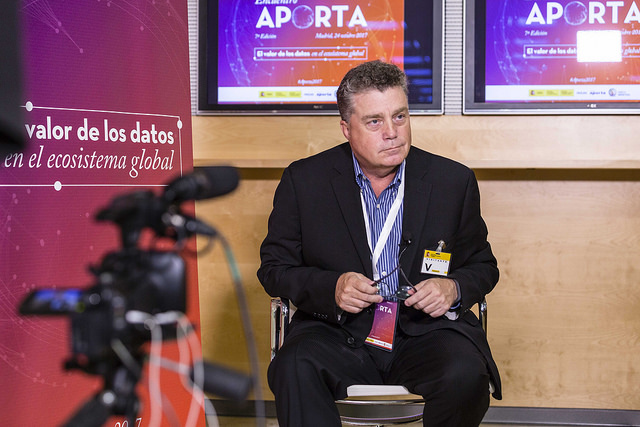
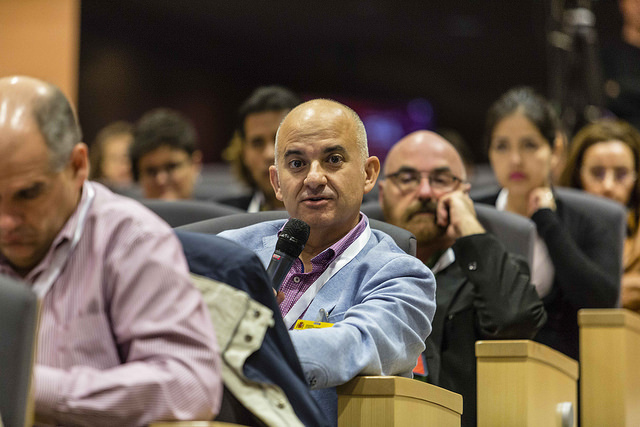
The first of the three blocks which the meeting was structured around analysed the value of data, which the project manager of the European Data Portal, Wendy Carrara, quantifies as 325 billion euros in Europe, with a return of 14 euros for every euro invested. In terms of its use, she believes that the true value lies in the combination of different types of data and sources, “there is no data that is more important than the other”, and encourages publishing everything possible so that third parties can decide how to capitalise this volume.
For his part, the president of the Multisectorial Association of Information (ASEDIE), Dionisio Torre, shared data from the Spanish infomediary sector, which has a turnover of almost 1.705 billion euros, especially related to geographical information. Also as the general director of Axesor, Torre commented on different data exploitation models, such as the development of tools for clients risk management, that help to reduce losses due to non-payments and to decrease management times. Other examples shown included indicators for valuing housing, local shops and estates, or linked to the consumption of different products; analysing market niches, with algorithms that locate areas where the demand of products and services is high; calculating commercial routes; analysing the overlapping of areas of influence; or establishing relations between those who can help us to discover business networks.
The discussion also included participation from the executive director of the Latin American Open Data Initiative (ILDA), Fabrizio Scrollini, who wanted to highlight the social value of data, which he sees as “living infrastructures, which have a cost that does not always give an immediate return, but does have social benefits. Data can help to combat, for example, domestic violence, which is important”, and he encouraged public administrations to think about the social value of data, proposing key issues such as what social problem am I trying to solve? Or what is my hypothesis for how to add or create value by using data?
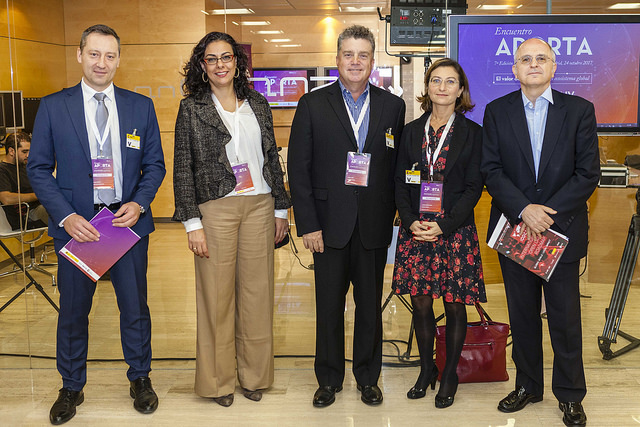
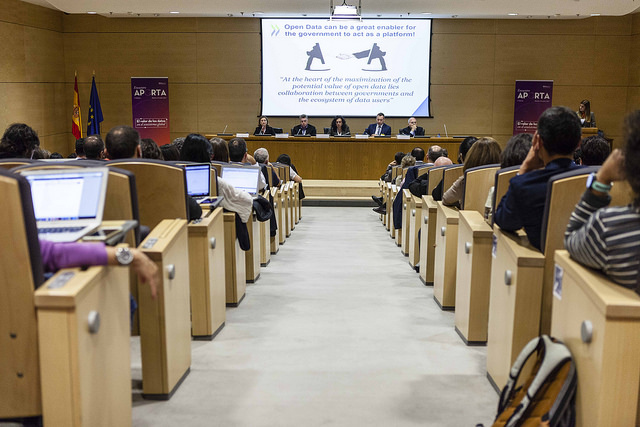
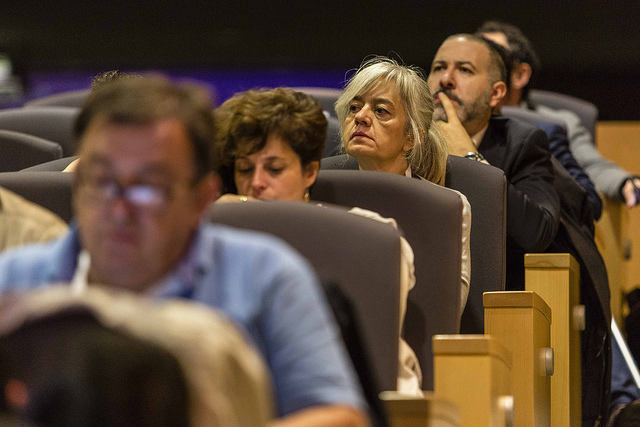
The permanent professor from the Library science and Documentation of UC3M department, Eva María Méndez, shared her vision from a research perspective, asking how much data from researchers end up in the EU portal and how many create airtight research portals. Also, she showed her concern over what she considers a gap between research data and data to research, highlighting that the European Commission is preparing an initiative to re-use data for administration and those finances with public funding, that helps both communities to converge
The second of the blocks, mostly made up of international experts, reviewed the advances in the road map, after the 4th International Open Data Conference was held last year in Madrid. Stephen Walker, of the Open Data for Development (OD4D), gave an overview of how the movement of open data has evolved, demonstrating the need to further analyse the impact achieved in the last year, to highlight “what has been done up until now and how has it been achieved”. This way, he numbered seven areas of work identified, which included searching for greater political commitment, especially in countries that before were leaders but are now stagnating or even decreasing in their push on open data policies; revising standards; capacity building in terms of leaders who help to educate about data culture; the effort of collaboration networks; approaching specific problems; decision-making and how to use data to support the sustainable development agenda.
For his part, Szymon Lewandowski, Legal/Policy Officer of the European Commission, called for specific regulation and funding models to help Europe reach the 4% GDP growth by 2020. Lewandowski also shared figures from the European Open Data Portal which demonstrate the sound progress of the sector’s economy, “there is a lot of potential in the data and reasons to undertake initiatives in European policy”. The speaker also highlighted the Commission’s commitment for 2018 through the concept “Data package”, which encompasses a diverse group of data, such as Business Data, Government Data and Scientific Data, which will help to stop thinking about open data as an independent group of data, so that it can be integrated and attain value in data across different sectors.
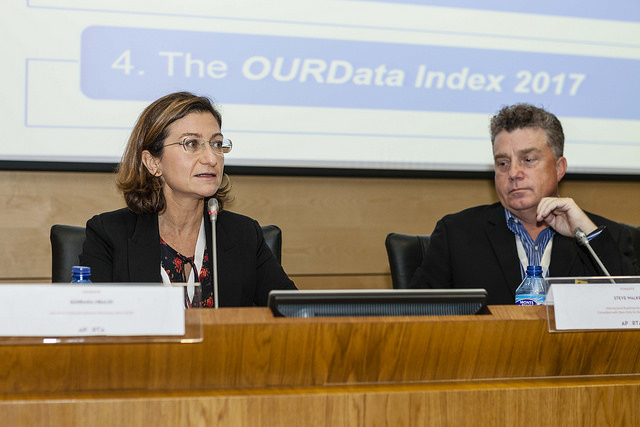 The head of Open Data for the Organisation for Economic Co-operation and Development (OECD), Bárbara Ubaldi, praised the work done in Spain which had allowed it to reach sixth position in the Open-Useful-Reusable data Index (OUR Data Index). For the speaker, the re-use of data is essential as “it has a high opportunity cost that is shown in the form of economic interest, efficiency of the public sector and social value, to empower citizens”. Also, she believes that “data can increase its value if it is standardised” and she demonstrates that “the aim of the Charter is to build a common framework between countries freely, to avoid the digital divide”. Also, to promote co-creation, the number of datasets has to increase but, also, these have to be made accessible. Salvador Soriano, from the Secretary of State for Information Society and Digital Agenda (SESIAD), agreed that this data is positive for Spain, “those who have contributed to the Aporta Initiative and the National Data Catalogue of Datos.gob, which is fuelled by regional data (48%), local governments (28%) and the General State Administration (24%), mainly INE and CSIC, some 16,000 datasets in total”. Salvador recognised that, “we have to measure the economical -because it is easy-” but also we have to find out “how it impacts on society”. Finally, he encouraged those attending to “make the data economy a major asset for the country”.
The head of Open Data for the Organisation for Economic Co-operation and Development (OECD), Bárbara Ubaldi, praised the work done in Spain which had allowed it to reach sixth position in the Open-Useful-Reusable data Index (OUR Data Index). For the speaker, the re-use of data is essential as “it has a high opportunity cost that is shown in the form of economic interest, efficiency of the public sector and social value, to empower citizens”. Also, she believes that “data can increase its value if it is standardised” and she demonstrates that “the aim of the Charter is to build a common framework between countries freely, to avoid the digital divide”. Also, to promote co-creation, the number of datasets has to increase but, also, these have to be made accessible. Salvador Soriano, from the Secretary of State for Information Society and Digital Agenda (SESIAD), agreed that this data is positive for Spain, “those who have contributed to the Aporta Initiative and the National Data Catalogue of Datos.gob, which is fuelled by regional data (48%), local governments (28%) and the General State Administration (24%), mainly INE and CSIC, some 16,000 datasets in total”. Salvador recognised that, “we have to measure the economical -because it is easy-” but also we have to find out “how it impacts on society”. Finally, he encouraged those attending to “make the data economy a major asset for the country”.
The final block was dedicated to new technology used for open data. For the head of Territorial Analysis at BBVA Data & Analytics, Juan Murillo, it is clear that we all leave a digital footprint, therefore, it is important to work openly so that data can be re-used and, above all, analysed. Also he wanted to translate two clear messages. Encouraging management based on proof and the ability to measure everything through different sources in order to have a global vision.
From a business perspective, the Head of Innovation&Discovery at AURA/CDO from Telefónica, Antonio Gúzman, pointed to security as an inherent factor in opening and exploiting data. Also, he referred to four fundamental factors in treating data: volume, variety, speed and veracity, emphasizing the importance of the final factor. So that companies can make better decisions based on reliable data analysis, it is necessary to provide them with “infrastructure that lowers the access and exploitation of information”.
Other speakers, the coordinator for the Area of Technology for the Office of SESIAD, David Pérez, focused on natural language technologies, calling for more text corpora, abstract and taxonomies to enable the training of these multilingual classification systems. For this, he called for common repositories, although he did highlight the immense richness of current resources, such as those provided by public administrations. However, he recognised that semantic resources are very expensive and, therefore, he believes it is necessary to reach international agreements and common projects. In the third discussion, the executive partner of the consultant Gartner, Javier González Marcos, also participated and shared a very positive perspective on the sector, which he said was “in vogue”. He also wanted to make some recommendations so that all bodies and companies who want to undertake projects to open up their data, such as having a scalable budget, monitoring advances that arise in the platforms and technology, controlling costs, security and strategy, and not to rely solely on our infrastructure and searching for cloud solutions.
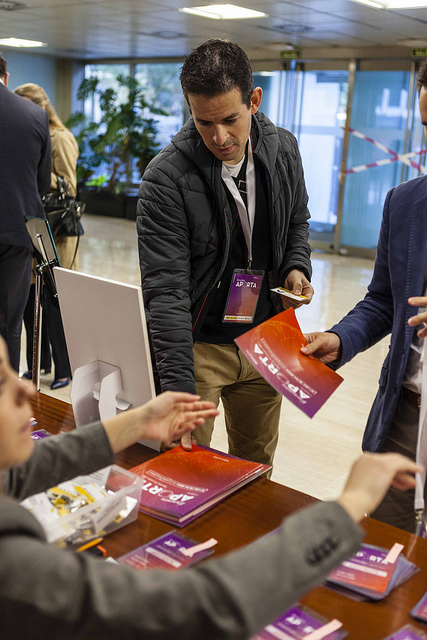
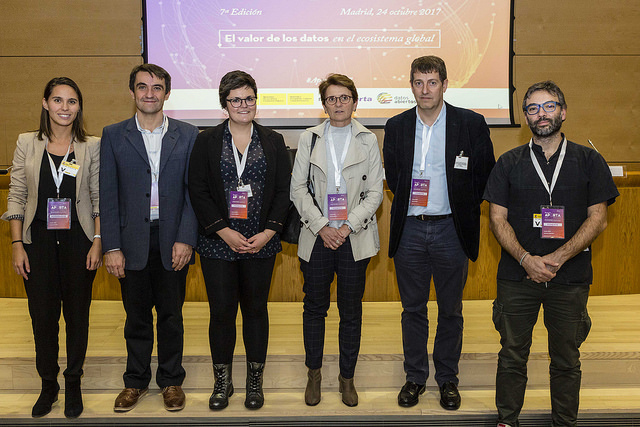
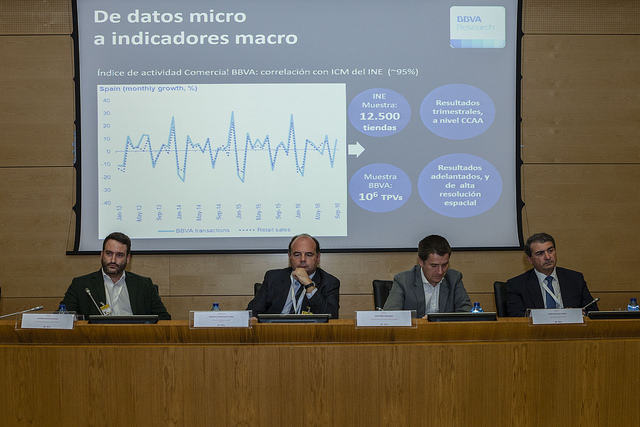
The final part of the event was dedicated to the presentation of the conclusions drawn from the previous events to Aporta 2017, which took place in Madrid during the whole month of October. Before closing, the awards were handed to the winners of the Aporta Challenge 2017: The value of data for Government and the Aporta Awards 2017, which recognise the best projects on the re-use of data and apps designed to improve the efficiency of public administrations in Spain.
Galery of the event pics
The International Open Data Day is celebrated on Saturday 4 March. For the fifth time in history, organizations around the world and local groups will create different events, conferences, workshops and activities in their community to show the benefits of open data and their re-use while promoting the adoption of open data policies in governments, companies and civil society.
In Spain, the institutions Open Knowledge España, ODI Madrid and Medialab-Prado organize the Open Data Day Madrid. It is an open data hackathon where developers, programmers, designers, journalists and users have the opportunity to participate in different projects to re-use open data.
In this edition, the international organization will focus on four key areas in which open data play an important role: Open research data, tracking public money flows, open data for environmental and open data for rights humans. In addition to these issues, the Madrid call will include in its agenda a workshop on data journalism: La España Vacía (The Empty Spain). This activity, organized by MediaLab-Prado, is aimed at data journalists, statisticians or analysts who re-use the data to elaborate a journalistic story related to demographic flows in Spain, spatial planning or differences between rural or urban areas, among others.
Since 2 February, the call for proposals is open, participants have to collect and analyse data from reliable and localized sources, presenting their projects with an open license that allows their reuse and distribution. The selected projects will be advised by national and international media professionals and experts in data analysis, treatment and visualization.
MediaLab-Prado also invites the participants to show their projects in the event Open Data Day Madrid, so the rest of attendees have the opportunity to enrich the data sources of the projects before the submission deadline, on 12 March.
Those people who want to work on one of the projects selected during one of the three sessions of the workshop that will take place in April, May or June may register as collaborators in the Medialab-Prado website from March 6. The rest of the open data community that wants to attend or share their ideas during the Open Data Day Madrid can join the Medialab list on data journalism or contact OKFN Spain sending an email to okfn@okfn.es or via their official Twitter account @okfn_spain.
In 2011 the project Sharing is caring was born in Denmark. An initiative to organize different national seminars that promote the openness of the information of the GLAM sector (galleries, libraries, archives and museums).
The first event took place in November 2011 bringing together a large number of participants from all over Denmark, from large and small institutions, museums, libraries, archives, educational institutions and members of the Wikipedia community. Such was the success of this initial call that Sharing's Caring also attracted assistants of other Nordic countries, working together in the development of a technological framework that allowed to share the digitized collections with the rest of the world, promoting the international cooperation for the development of the GLAM sector in the XXI century.
Desde entonces, Sharing’s Caring organiza cada dos años una conferencia donde se abordan diferentes aspectos relevantes en la apertura de los datos culturales que incluyen desde casos reales que muestran el impacto de la digitalización de contenidos hasta paneles específicos donde artistas, profesionales del sector y expertos en copyright debaten sobre arte contemporáneo, medios digitales y derecho de propiedad.
Since then, Sharing's Caring has organized a conference every two years where different aspects of the open cultural data are discussed, including real cases that show the impact of the content digitization and specific panels where artists, professionals and experts in Copyright discuss on contemporary art, digital media and property rights.
Digitization and social impact?
As digitalisation has become an important task for the cultural sector, more and more institutions are providing access to their collections in digital format. However, open data goes beyond the mere online access to information, it involves sharing the authority to interpret those assets and encourage their re-use.
In this context, the following questions arise: How can open data in the GLAM sector become a joint advantage for institutions, as well as for their public and society in general? What are the challenges faced by the movement in terms of copyright, institutional policies and social impact? These issues will be answered at the next two conferences that Sharing is Caring has organized this year.
For the first time in its history, the initiative crosses its borders in April 2017 to hold an extension of its national conference in the city of Hamburg. With the collaboration of the Museum für Kunst und Gewerbe and the University of Hamburg, from 20 to 21 April there will be different talks and workshops where participants will share their experiences and knowledge about open access to cultural content.
Moreover, the fifth edition of the Sharing is Caring seminar will be held in Aarhus (Denmark) in November, where, under the same motto as the German call, the role of the open cultural data in citizen participation and its impact on society will be discussed.
Would you like to assit? For more information on each event, visit the official Sharing's Caring website: http://sharecare.nu/
The State Secretariat for the Information Society and the Digital Agenda (SESIAD), together with the Public Business Entity Red.es, organize the first Hackathon of Language Technology with the goal of promoting the development of technological applications based on the natural language processing and the automatic translation through the creation of open source prototypes with concrete functionalities related to this area.
The competition consists of two phases: first, the participants will have to present their ideas on the theme: "How to apply Open Language Technologies", in particular, a proposal of an open source within 15 calendar days once the list of admissions is published.
The 10 best prototype proposals will go to the second phase, selected by a jury that will choose the candidates according to the criteria established in the conditions of the hackathon and assessing:
- The degree of innovation, originality and creativity in the area of language technologies.
- The feasibility of the prototype.
- The utility of the proposal, taking into account the difficulty level of the problem it solves, the number of potential recipients, etc.
The selected participants will participate, next February 27 in Barcelona, in a competition where they will develop and present, at the 4YFN 2017 event, the proposed open-source prototypes in which any programming language can be used.
The participation in this first Hackathon of Technology of Language is free and open to any physical, legal or business person who meets the terms and conditions, available on the website of Red.es, and submits the form before January 16.
The global open data community continues to mature since the last International Open Data Conference was held in 2015 in the Canadian city of Ottawa. One year later, it’s time to continue to strengthen coordination between the different open data initiatives and projects in the world with the new edition of IODC to be held, in this occasion, in Madrid. In addition, in order to broaden the dialogue, include voices of experts in several fields and delve into specific themes, different events will take place in the days before the conference.
Thus, from 3rd to 5th October, the Spanish capital will host thirty meetings about open data which will become the warm-up to the big open data event. Thus, they have been organized in different spaces workshops and working groups to advance and share knowledge in areas such as open data standards, open science, open linguistic data or data innovation in developing countries.
In parallel, the official headquarters of the public company Red.es is the place chosen for the different sessions that will address over three days the use of open data in extractive industries in order to discuss strategies, practices, real cases, international challenges and solutions in the field.
In addition to the above activities, the program prior to IODC 2016 also includes relevant events for both international and national open data community. This is the case of the sixth edition of Encuentro Aporta that gathers, once again, open data experts in the country to foster openness and reuse of public sector information in Spain. Moreover, in view of the occasion, the Research Symposium or Open Cities Summit will be held, this last event will analyze how urban environments are deploying open data solutions and their positive impact of the same on the daily lives of their citizens.
October 4th is the date chosen to celebrate in the IFEMA Convention Center the FINODEX Odine meeting which will analyze the results obtained in the different open data accelerators and incubators in Europe, showing the work of the start- ups participating in the initiative. In the same space and day, the CKAN Conference, aimed at developers, will bring participants the latest news from this open-source platform and explain how to implement the tool in any organization.
Finally, on Wednesday the 2016 Open Data Leaders Summit will bring together leaders of government open data initiatives to learn from each other, and discuss strategies for the successful implementation of open data programs at local, regional and national level.
Three days full of workshops, meetings, conferences and talks that anticipate an International Conference that, under the theme "Global goals, local impact" is expected to lay the foundations for the future of the open data movement in the world; thanks to the participation of experts, users, private companies, civil organizations and citizens who are committed to the openness of information as an engine for change.
From 22 to 23 June, Valladolid hosts the 1st International Forum on Urban Forestry in Mediterranean Cities, a meeting organized by the LIFE + Quick Urban Forest project to share and discuss with researchers, urban managers and technicians about techniques and advances in planting in degraded urban areas in Mediterranean climates; while social projects and initiatives on urban forestry are show as well.
The program includes four sessions: one on social approach, another on local politics and two technical sessions, of which one is dedicated to monitoring and intelligent data analysis. The aim is to show attendees the state of sensor technology, the importance of big data and Internet of Things and its application to interpret the results.
The forum is not only designed for technicians responsible for forestry management or researchers, the organization has also invited experts and private companies specialized in data intelligence and regional associations and members of other similar projects.
En el primer cuatrimestre de 2015, la comunidad open data global tiene la oportunidad de disfrutar de dos eventos a escala internacional los cuales promueven el acceso abierto a la información pública para su transformación en soluciones prácticas para la ciudadanía.
El primero de ellos se celebrará el próximo 21 de febrero, con motivo del Día Mundial de los Datos Abiertos. Organizado por la OKFN España, el Hackatón Internacional de Datos Abiertos tendrá lugar en la misma fecha y espacio que el acto de entrega del II Premio al Conocimiento Abierto, Open Data y Transparencia organizado también por la misma entidad.
El encuentro estará abierto a reutilizadores open data de toda índole –ciudadanos, desarrolladores, periodistas, diseñadores,…- para que desarrollen aplicaciones, herramientas y visualizaciones de datos abiertos; demostrando así el potencial que encierran este recurso para el avance socioeconómico global.
El acceso al evento será libre y gratuito, poniendo a disposición de la comunidad open data internacional diferentes canales para que puedan compartir sus ideas con el resto de participantes. Gracias al streaming de vídeo, hangouts, chats y wiki cualquier miembro en el mundo tendrá la oportunidad de seguir el evento y los diferentes proyectos que se presenten durante la cita.
Asimismo, el próximo 4 de marzo tendrá lugar en Quito (Ecuador) el IEEE Hack Ecuador Challenge 2015, hackathon organizado IEEE STC e-Government e IEEE Computer Society a través de IEEE Ecuador.
El objetivo de este encuentro será el desarrollo de una visualización o aplicación que, reutilizando datos abiertos, optimice los portales electrónicos del gobierno de Ecuador, mejorando y promoviendo los servicios digitales en el sector público del país.
El plazo de inscripción se abrirá el 20 de febrero para todos aquellos interesados que, en grupos compuestos por al menos dos personas, deseen participar en este concurso de datos abiertos.
Tras la celebración del hackathon el 4 de marzo, los participantes tendrán hasta el día 18 del mismo mes para enviar la demo funcional de las aplicaciones desarrolladas durante el encuentro. Un jurado de expertos seleccionará a los finalistas y se anunciarán los ganadores el 8 de abril para, una jornada más tarde, hacer la entrega de premios en la capital ecuatoriana.
A través de sendos hackathons, la comunidad internacional de datos abiertos pretende fomentar la apertura de la información e involucrar a organizaciones cívicas y entidades privadas en la cultura open data para que contribuyan en la generación de soluciones innovadoras a partir de datos abiertos.
En su quinta edición, el Encuentro Aporta se ha consolidado como uno de los eventos más importantes en el panorama open data nacional, congregando a un nutrido grupo de expertos en la materia pertenecientes a diferentes organismos públicos e instituciones del sector privado en España.
En esta ocasión, bajo el lema “El dato público en un sociedad digital”, más de una docena de profesionales de quince entidades debatirán el próximo 26 de febrero los desafíos –técnicos, legales y organizativos- que supone la puesta en marcha de un proyecto de datos abiertos; las claves para asegurar el éxito en el tiempo de una iniciativa de estas características; exponiendo, además, ante los asistentes casos reales y ejemplos prácticos de corporaciones españolas.
Entre los participantes de las tres mesas redondas que conforman el evento, la primera de ellas contará con representantes del Centro de Investigaciones Sociológicas, la Región de Murcia, del Ayuntamiento de Cáceres, Open Data Euskadi y AEMET, quienes compartirán recursos para la apertura de la información pública y técnicas que fomenten la reutilización de dicho recurso.
Cinco expertos, referentes en el sector internacional de los datos abiertos – el experto independiente Carlos Iglesias, Julián Valero de la Universidad de Murcia, Chus García de W3C, Óscar Corcho de UPM y J. Manuel Alonso de la WWW Foundation- serán los ponentes de la segunda mesa de la jornada, donde se expondrán posibles nichos de mercado para que la comunidad infomediadora explote la información pública así como estrategias que garanticen la perdurabilidad y calidad de las iniciativas open data actuales.
Por último, el evento dará cierre con la participación de Telefónica I+D, Everis, BBVA, Tecnalia, Gnoss y Libelium que, en representación de la esfera empresarial, mostrarán a los asistentes la oportunidades de negocio que se esconden tras los datos y el impacto positivo de los mismos en la sociedad.
A tan solo cuatro semanas de su celebración, el Encuentro Aporta 2015 se complace de contar con representantes de todos los grupos de la comunidad de datos abiertos nacional –publicadores, infomediarios, entidades privadas y usuarios finales- para, así, poder afrontar la situación del sector desde todos los puntos de vista posibles y encontrar respuestas a sus necesidades.
Más información sobre el encuentro aquí